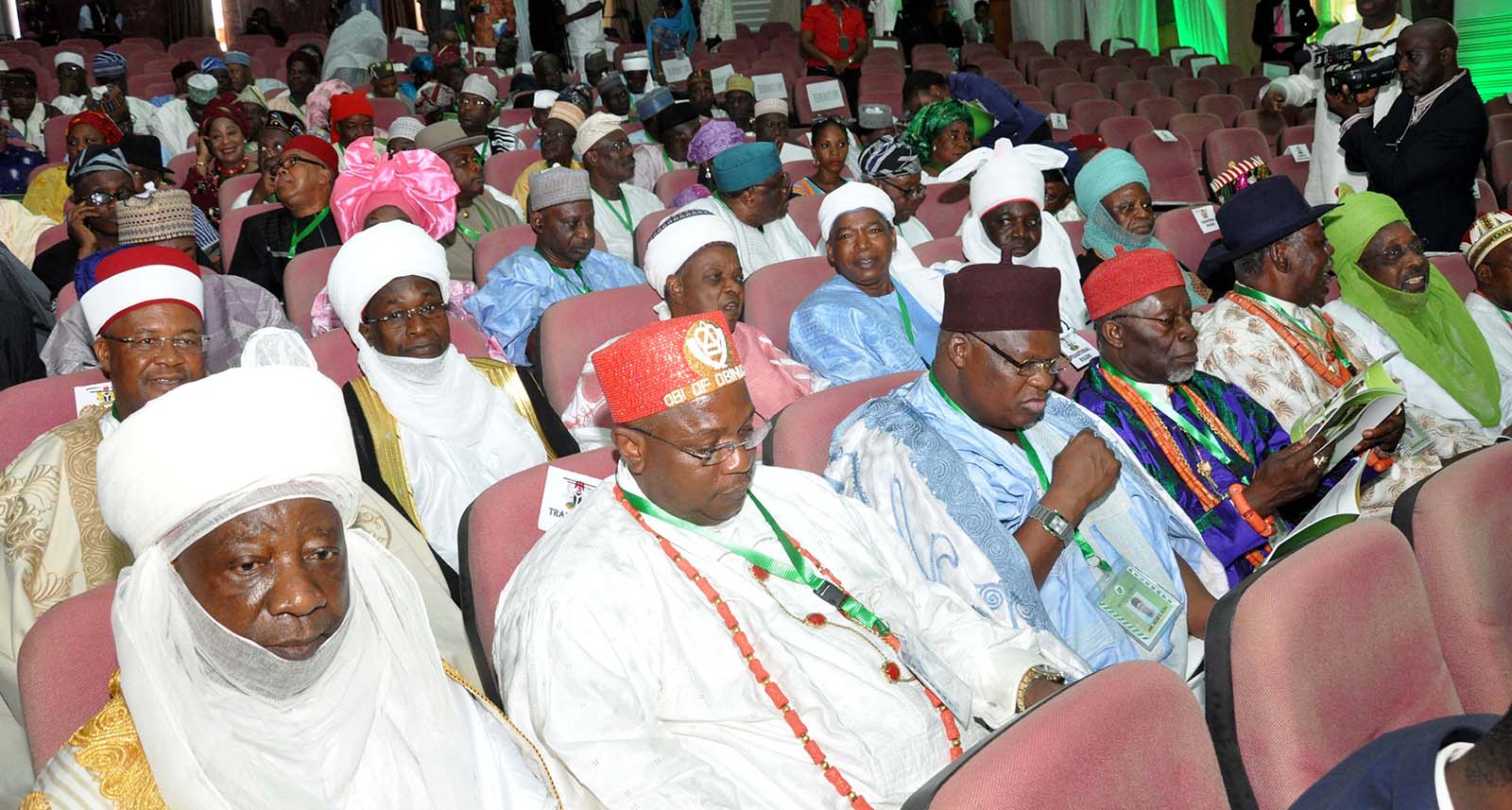There was a rowdy session yesterday at the continued consideration of reports by delegates at the on- going National Conference as the Chairman, Justice Idris Kutigi and his Deputy, Prof. Bolaji Akiyemi had to caution delegates by threatening to walk them out if they become unruling and refuse to adhere to Procedure Rules.
At yesterday’s plenary when delegates opened discussions on the recommendations of Gen. A.B. Mamman led Committee on Land Tenure Matters and National Boundaries, with Oba Michael Adedeji as deputy, there was a sharp division between Northern and Southern delegates over the recommendation that the Land Use Act be expunged from the Constitution of the Federal Republic of Nigeria as it has failed to address the problems of land due to its poor implementation.
Meanwhile, delegates adjourned plenary till monday at 9am as against 10am to resume discussions on reports of Committees on Environment and Religion, just as reports and recommendations of Committee on Citizenship, Immigration and Related Matters were adopted.
The Land Tenure Committee recommended that the Land Use Act should be replaced with new provisions that would guarantee the right of Nigerians to have access to land irrespective of ethnic origin, adding that it would also ensure the right of communities to have their land protected from human activities that would hinder or degrade the productivity of such land through such activities as pollution, flooding, among others.
While most of the delegates declared the various recommendations submitted by the committee as remarkable and daring, others said they were not implementable as they were drafted to favour certain classes of people or ethnic groups against the others.
For good three times, there was voice vote on the matter, but following delegate inability to reconcile issues, the Chairman, Kutigi stood it down to allow for further consultations.
Also yesterday, delegate threw out amendement to allow for compensation for Bakassi people, the people of Cross River State and any other community in Nigeria that must have lost its territory to another country, just as Nays had it when it was put to vote.
Also yesterday, delegates after series of intrigues and lobbying, there was modified amendment to the grazing reserve controversial issue as delegates adopted an amendment to the controversial motion on grazing reserves and approved an integrated development, livelihood for Fulani Herdsmen, just as it was unanimously adopted by the delegates.,
It was a proposed amendement to an earlier recommendation by the committee on Citizenship, Immigration and Related Matters against the creation of grazing reserves across the country which caused uproar at Wednesday at Plenary.
The motion sponsored by 14 delegates and read by Mr. Festus Okoye, a delegate on the platform of Civil Society Organisations, contained three prayers sought that an integrated development and livelihoods modernization programme be implemented.
The motion which contained three prayers sought that an integrated development and livelihoods modernization programme be implemented.
The National Conference yesterday resolved that an integrated development and livelihood modernisation programme be designed and implemented to address the issue of settling nomadic herdsmen into settled communities and stem the tide of violent conflicts between Fulani herdsmen and sedentry farmers.
The proposed modern settlements would be based on established cattle ranches with fodder development technologies including abattoirs, processors and other businesses along the livestock value chain, just as the integrated development and modernisation programme would be funded by both the federal and state governments in states where such settlements are allowed and established.
In addition, the Conference resolved that this integrated development programme should be undertaken and wrapped up within a period of five to ten years after which such settlements should have become self sustaining with the full sustaining with full integration of the monadic herdsmen community into modern Nigeria political economy.
These resolutions followed a motion sponsored by Jaiye Gaskia, a delegate representing Civil Society and 13 others.
Okoye who noted that the motion was to address issues of settling nomadic herdsmen into settled communities based on establishment cattle ranches with fodder development technologies including abattoirs, processors and other businesses along livestock value chain, said, “That the programme should be funded by both federal and state governments where such settlement are established.
“That the integrated programme should be undertaken and wrapped up within five to 10 years after which such settlements should have become self-sustaining with the full integration of the nomadic community into modern Nigeria political economy.”
It would be recalled that the he committee had recommended that grazing reserves and new technologies such as hydroponic fodder solution for feeding cattle should be promoted by governments and also recommended that dedicated funds for the acculturation and acclimatization of herdsmen should be provided for herdsmen to settle down at designated grazing reserves.
And a delegate from Benue state Dr. Magdalene Dura rose to object to the proposal that it would infringe on the rights of Nigerians and as well as give Nomads undue advantage over other ethnic nationalities to the provision of the constitution.
Also among the 14 delegates are Femi Falana (SAN), Naseer Kura, Rev, Nnimmo Bassey, Ezenwa Nwagwu and Bisi Olateru Olagbegi among others.
The motion was seconded by Mr Mike Ozakhome, a federal government delegate, which was unanimously adopted by the conference, in obvious indication that the conference delegates closed ranks to come to the conclusion that the Federal and State governments should establish grazing reserves and ranches in States with nomadic herdsmen, where it is desirable.
Ozekhome said, “We recognized the utmost importance of ensuring that no segment of the Nigerian society and no Nigerian citizen is excluded from equitable access to enjoy all the guaranteed human rights, as well as access to basic services and social infrastructures that will make life more meaningful and more enhanced.”







